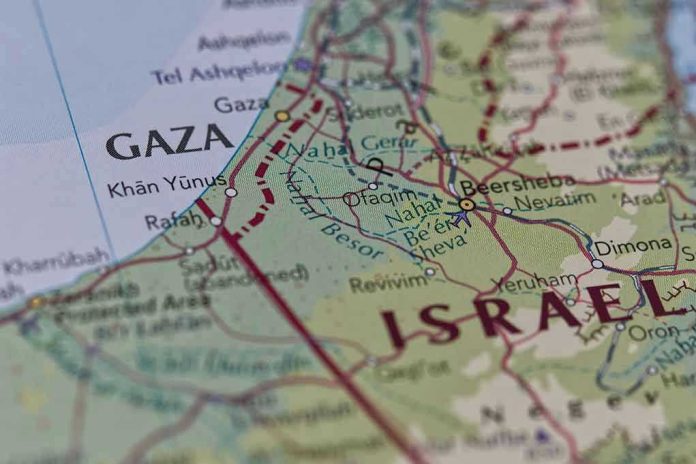
Pope Leo XIV’s recent conversation with Palestinian President Mahmoud Abbas has stirred the global community, as the Pope calls for urgent humanitarian aid to a conflict-stricken Gaza, echoing frustrations over continued violence and displacement.
At a Glance
- Pope Leo XIV demands urgent humanitarian aid for Gaza.
- Papal appeal follows Israeli airstrike on Gaza’s only Catholic church.
- International condemnation of forced displacement and indiscriminate force.
- Humanitarian crisis in Gaza remains dire with ongoing military operations.
Pope Leo’s Humanitarian Appeal
Pope Leo XIV, in a significant move, has reached out to President Mahmoud Abbas, emphasizing the urgent need for humanitarian assistance in Gaza. The Pope reiterated the Vatican’s staunch opposition to the forced displacement of Palestinians and the reckless use of force that has plagued the region. This conversation follows a recent Israeli airstrike on Gaza’s only Catholic church, which resulted in three casualties, drawing international outrage and a rare apology from Israeli Prime Minister Benjamin Netanyahu.
The humanitarian situation in Gaza is dire, with reports of mass displacement and severe food shortages. The Vatican, long a proponent of peace and protector of religious sites, has been vocal in its calls for respect for international humanitarian law and the protection of civilians. Pope Leo’s intervention underscores the moral and diplomatic weight the Vatican carries, even in the face of complex geopolitical dynamics.
Escalating Tensions and International Response
Intensified Israeli military operations in Gaza have sparked significant civilian casualties and widespread destruction. The recent bombing of the Catholic church in Gaza has heightened tensions between Israel and the Vatican, a relationship already strained by ongoing violence. The West Bank has also witnessed increased violence, particularly from Israeli settlers targeting Palestinian villages, including Christian communities.
Pope Leo’s call to President Abbas aligns with a growing international clamor for a ceasefire and the end to what many see as a humanitarian crisis that violates basic human rights. The Pope’s advocacy for aid access and civilian protection adds pressure on Israel to comply with international norms, though tangible changes remain elusive.
Diplomatic Challenges and Opportunities
The Vatican’s diplomatic engagement in the Israeli-Palestinian conflict is not new. Since formally recognizing the State of Palestine in 2015, the Holy See has consistently advocated for a two-state solution and the protection of holy sites. The current crisis presents both challenges and opportunities for the Vatican’s diplomatic efforts, as Pope Leo seeks to influence international opinion and policy.
The complexity of power dynamics in the region complicates these efforts. While the Vatican wields considerable moral influence, it lacks direct political power. Meanwhile, the United States’ steadfast support for Israel adds another layer of complexity to diplomatic resolutions, despite growing international calls for restraint and humanitarian access.
Impact on Regional Stability
The ongoing conflict and humanitarian crisis in Gaza have significant short-term and long-term implications for regional stability. In the short term, continued violence leads to civilian casualties and displacement, while international pressure mounts on Israel regarding its humanitarian law compliance. In the long term, the potential deterioration of Christian and Muslim communities in Gaza and the West Bank poses a threat to regional coexistence.
The humanitarian sector faces increased operational challenges, while religious institutions may encounter heightened security risks and diplomatic tensions. As the Vatican continues its advocacy, the international community’s response to Pope Leo’s appeals will be crucial in shaping future developments in the region.







